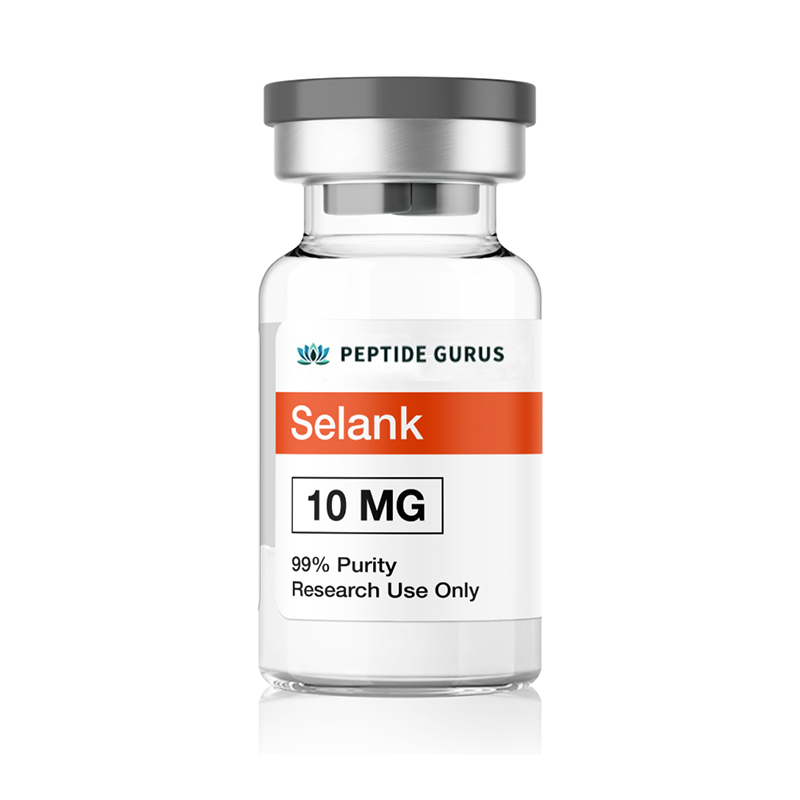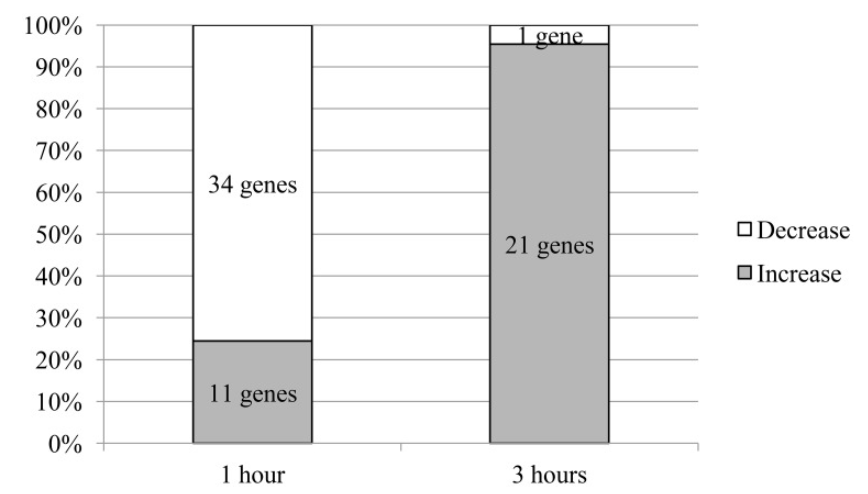



Categories: Peptide Finished product, Peptides and Their Dosages
Free (1) 30 ml Bacteriostatic Water
with qualified orders over $500 USD.
(excludes capsule products, cosmetic peptides, promo codes and shipping)
Selank is a short, synthetic analogue of tuftsin. It has profound anti-anxiety properties. Selank also boosts memory and learning and has been shown to have beneficial effects on pain perception.
Product Usage: This PRODUCT IS INTENDED AS A RESEARCH CHEMICAL ONLY. This designation allows the use of research chemicals strictly for in vitro testing and laboratory experimentation only. All product information available on this website is for educational purposes only. Bodily introduction of any kind into humans or animals is strictly forbidden by law. This product should only be handled by licensed, qualified professionals. This product is not a drug, food, or cosmetic and may not be misbranded, misused or mislabled as a drug, food or cosmetic.
Selank, which was developed in Russia, is a short peptide with nootropic and anxiolytic properties. It is a synthetic analogue of naturally occurring Tuftsin, an immunomodulatory peptide that modulates IL-6, T helper cells, monoamine neurotransmitters, and brain-derived neurotropic factor (BDNF). In fact, Selank and Tuftsin are essentially the same except that Selank has an additional four amino acids in its chain that help to improve metabolic stability and half-life.
Selank has been tested in clinical trials as a potential treatment for generalized anxiety disorder.
Sequence: Thr-Lys-Pro-Arg-Pro-Gly-Pro
Molecular Formula: C33H57N11O9
Molecular Weight: 751.887 g/mol
PubChem CID: 11765600
CAS Number: 129954-34-3
Synonyms: Selanc
Source: PubChem
According to Dr. Anastasiya Volkova of the Institute of Molecular Genetics in Russia, “numerous clinical studies have shown that Selank has strong antianxiety and neuroprotective effects in the treatment of anxiety. The clinical effects of Selank are similar to those of the classical antianxiety medications such as benzodiazepine, which are allosteric modulators of GABAA receptors and increase the inhibitory action of GABA.” Selank’s effects include reducing anxiety, improving mood, lower stress levels, and positively influencing memory and learning. Like benzodiazepines, low doses of Selank have a sedating effect. Unlike benzodiazepines, Selank does not appear to be habit-forming and does not lead to symptoms of withdrawal or amnesia.
Research in rats shows that of the 84 genes known to be connected to GABA signaling in some way, seven are heavily modulated by Selank and 45 show some change in expression when the peptide is administered. Overall, 52 genes related to GABA signaling are affected by Selank to some degree. These results indicate that Selank can directly influence the expression of genes in nerve cells and that it likely produces effects by changing the affinity of the GABA receptor for GABA[1]. This alteration of receptor affinity likely explains why Selank is synergistic with benzodiazepines and other GABA receptor agonists.

Research in rats shows that Selank and benzodiazepines, when used alone, have similar effects on anxiety, particularly generalized anxiety disorder. Selank may hold a slight advantage over benzodiazepines when attempting to reduce elevated levels of anxiety, but a combination of the two treatments appears to be the best in treating unpredictable chronic mild stress[2].
The effects that Selank has on GABA receptors may be modulated, to some degree, by the peptide’s effect on enkephalin degradation. Testing indicates that people with anxiety and phobic disorders demonstrate increased enkephalinase activity in the blood during generalized anxiety and, as a result, the enkephalins they produce have shorter half-lives[3]. By preventing degradation of enkephalins through enkephalinase inhibition, Selank may be resetting this enzymatic pathway and helping to protect the body’s natural anxiolytic peptides. Research in mice prone to anxiety supports the hypothesis that at least part of the impact that Selank has is a result of preventing enkephalin degradation[4].
Research in patients with depression indicates that Selank can suppress the gene responsible for the production of the inflammatory cytokine IL-6. Interestingly, this effect is only seen in patients with depression and does not appear to take place in healthy individuals[5]. This suggests that Selank may be useful in treating people with anxiety-asthenic disorders, severe disorders in which anxiety is associated with fatigue, headache, heart palpitations, high blood pressure, nerve pain, and depression.
When comparing Selank to standard anxiolytic treatments, like benzodiazepines, the two treatments show similar benefits in reducing anxiety, but only Selank has any effect on asthenic symptoms like fatigue and pain[6]. Part of the effect is likely due to Selank’s ability to modulated IL-6 expression while part is likely due to the peptide’s ability to alter the rate of breakdown of the body’s natural pain killers, enkephalins.
Testing of Selank in rats has revealed that the peptide regulates the expression of some 34 genes involved in the inflammatory process. These genes affect chemokines, cytokines, and receptors for both. In particular, Selank has been found to alter expression of BcI6, a gene that is heavily involved in the development of the immune system[7]. This study, more than any other, revealed that Selank has very complex biological effects, but may help to deepen our understanding of how the immune system develops.
Selank and even fragments of Selank have been shown to temporarily alter gene expression for C3, CAsp1, Il2rf, and Xcr1 in the mouse spleen. By affecting these genes, Selank is able to alter the balance of the immune system and thereby modulate inflammation[8].
There has long been an association between anxiety and learning/memory. The correlation is a negative one, with increased anxiety leading to decreased ability to recall memories or store new information. Traditional anxiety treatments can reduce this effect, as can Selank, but Selank appears to do more than simply reduce the impact of anxiety on cognitive function. There is good reason to believe that Selank actually boosts cognition directly.
Research in rats trains with food rewards and injected with either saline or Selank has shown that Selank boosts memory trace stability and thus enhances the memory storage process[9]. It is important to note that this benefit was seen regardless of the anxiety levels of the rats, indicating that the peptide has effects beyond its ability to simply reduce stress-related impairment of memory.
It appears that Selank may alter memory by affecting the expression of a number of genes in the hippocampus. Research in rats shows changes in mRNA levels of 36 different genes after intranasal administration of Selank. Most of the genes encode proteins associated with the plasma membrane and may therefore modulate ion-dependent processes in learning and memory[10]. Though much research needs to be done to understand the mechanism by which Selank works to improve memory and learning, this research offers a tantalizing early clue to suggest that it alters the way neurons function in such a way that both forming and accessing memories is easier.
Research even suggests that Selank can help to rescue memory and learning following damage to the brain. Rats treated with a neurotoxin and then Selank showed restored cognitive processes in at least one study. This effect appears to be related to an artificial inhibition of the catecholamine system in the brain by Selank[11]. There is some hope that Selank will help to shed light on how cognitive function can be restored or at least improved following traumatic brain injury, particularly the kinds of injury that occurring during the birth process.
Selank may act to reduce the degradation of natural enkephalins by inhibiting the enzymes, found in human blood, that break them down[12]. Enkephalins are natural peptides that bind to opioid receptors and help to blunt the severity of pain. They also function in the human stress response and are found in high levels in the brain and adrenal glands. By reducing levels of enkephalins in the brain, Selank may help to blunt the normal stress response and the effects that it has on memory, learning, and concentration.
Selank exhibits minimal side effects, low oral and excellent subcutaneous bioavailability in mice. Per kg dosage in mice does not scale to humans. Selank for sale at Peptide Sciences is limited to educational and scientific research only, not for human consumption. Only buy Selank if you are a licensed researcher.
The above literature was researched, edited and organized by Dr. Logan, M.D. Dr. Logan holds a doctorate degree from Case Western Reserve University School of Medicine and a B.S. in molecular biology.
Dr. Petr Slominsky‘s 169 research works with 803 citations. 12 of those papers pertain to the examination of Selank’s diverse, multifaceted effects e.g. anxiety reduction, changes in the transcription profile of the hippocampus, and changes in expression of the genes for chemokines, cytokines, and their receptors. Dr. Slominsky is particularly interested in the epigenetic effects of Selank and other disease-state pathologies.
Dr. Petr Slominsky is being referenced as one of the leading scientists involved in the research and development of Selank. In no way is this doctor/scientist endorsing or advocating the purchase, sale, or use of this product for any reason. There is no affiliation or relationship, implied or otherwise, between Peptide Sciences and this doctor. The purpose of citing the doctor is to acknowledge, recognize, and credit the exhaustive research and development efforts conducted by the scientists studying this peptide. Dr. Petr Slominsky is listed in [7] under the referenced citations.
ALL ARTICLES AND PRODUCT INFORMATION PROVIDED ON THIS WEBSITE ARE FOR INFORMATIONAL AND EDUCATIONAL PURPOSES ONLY.
The products offered on this website are furnished for in-vitro studies only. In-vitro studies (Latin: in glass) are performed outside of the body. These products are not medicines or drugs and have not been approved by the FDA to prevent, treat or cure any medical condition, ailment or disease. Bodily introduction of any kind into humans or animals is strictly forbidden by law.
PeptideGurus is a leading supplier of American-made research peptides, offering top-quality products at competitive prices. With a focus on excellence and customer service, they ensure a secure and convenient ordering process with global shipping.
CONTACT